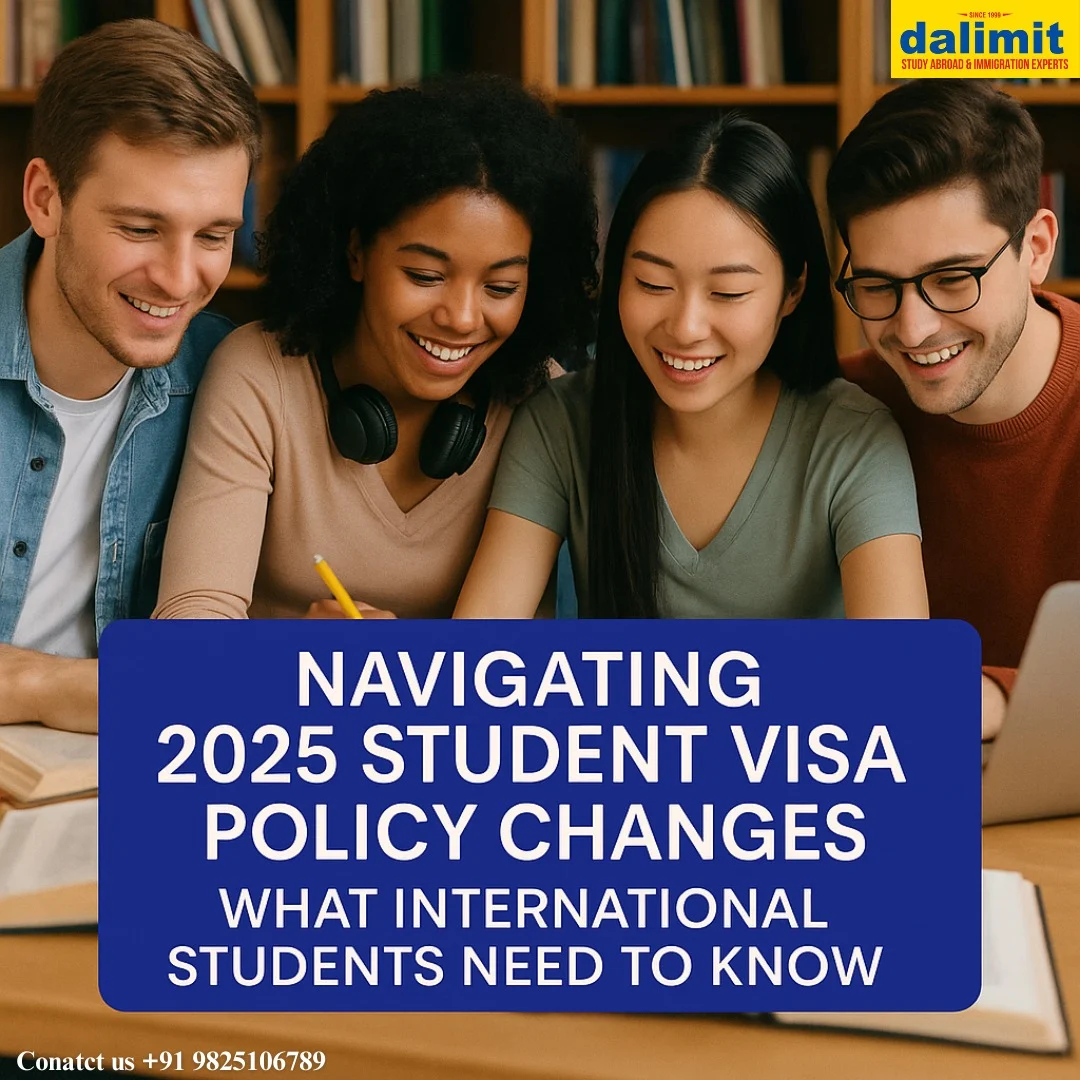For Indian students aspiring to pursue higher education abroad, 2025 brings a landscape of evolving student visa policies across popular destinations. Staying informed about these changes is crucial for a smooth and successful study abroad journey.
Key Policy Changes in Major Destinations:
- Canada:
- Reduced Study Permit Numbers: Canada is significantly reducing the number of study permits issued in 2025, with a cap set at 437,000, down from 485,000 in 2024. This has already resulted in a 31% drop in study permits issued to Indian students in the first quarter of 2025 compared to the previous year.
- Increased Proof of Funds: The financial proof required for study permit applicants has more than doubled. As of January 1, 2024, students need to demonstrate access to at least CAD 20,635 (approximately ₹12.7 lakh), up from CAD 10,000.
- Stricter Eligibility: The Student Direct Stream (SDS) for faster processing has been discontinued. Post-study work permit applicants now face stricter language proficiency requirements.
- Work Hour Increase: On a positive note, the off-campus work hour limit for international students has increased from 20 to 24 hours per week during academic terms.
- United Kingdom:
- Dependent Visa Restrictions: Effective January 2024, most international students on taught postgraduate courses are no longer permitted to bring dependents. This restriction primarily applies to non-research-based programs. Only PhD and research students can bring dependents.
- Graduate Route Under Review: The 2-year post-study Graduate Route visa is currently under government review, creating uncertainty about its future duration. Proposed changes in May 2025 suggest a reduction in the Graduate Route visa duration from two years to 18 months for undergraduate and Master’s students, and from three years to 18 months for PhD students.
- Increased Financial Requirements: The financial thresholds for student visas have increased. For studying in London, you’ll need to show at least £1,265 per month for living expenses.
- Stricter University Compliance: UK universities now face stricter compliance metrics to maintain their sponsorship licenses for international students, including minimum enrollment and course completion rates for admitted students.
- United States:
- Increased Visa Fees: As of March 2025, fees for B1/B2, F1, and H-1B visas have increased by 10-15%.
- AI-Based Screening: The U.S. Department of State is now using AI tools to pre-screen visa applications for fraud and misrepresentation.
- H-1B Visa Modifications: A “merit-first” evaluation has been added for H-1B applicants with U.S. STEM degrees.
- Potential OPT Restrictions: There are ongoing discussions about potentially restricting the Optional Practical Training (OPT) program, which allows international students to work in the US for a period after graduation.
- Australia:
- Updated Points Test: The points test for skilled visas now gives more weight to regional work and experience.
- Increased Financial Requirements: The proof of savings required for student visas has increased to AUD 29,710 (approximately ₹15.73 lakh).
- Higher English Language Standards: Stricter English language proficiency standards have been introduced for student visas.
- Potential Cap on International Students: While not yet finalized, there have been discussions about potentially capping the intake of international students.
- Visa Restrictions for Certain States: Several Australian universities have temporarily halted accepting applications from students from certain Indian states (including Gujarat, Punjab, and Haryana) to curb student visa abuse.
Impact on Indian Students:
These policy changes have several implications for Indian students:
- Increased Competition: Reduced visa quotas, particularly in Canada, mean increased competition for available study permits.
- Higher Costs: Increased financial proof requirements in Canada and Australia, along with potential tuition fee hikes in the UK, will raise the overall cost of studying abroad.
- Limited Work Opportunities: Stricter post-study work visa rules in some countries may limit opportunities for gaining international work experience after graduation. The review of the UK’s Graduate Route is a significant concern in this regard.
- More Scrutiny: Increased scrutiny of visa applications, including AI-powered screening in the US and more rigorous assessments in Australia, necessitate careful and well-documented applications.
- Need for Strategic Planning: Students need to be more strategic in their choice of destination and program, considering visa policies, post-study work prospects, and financial implications.
What Indian Students Need to Do:
- Start Early: Begin your research and application process well in advance of deadlines, accounting for potentially longer processing times. Aim to start 12-18 months before your intended start date.
- Thorough Research: Understand the specific visa requirements and policy changes for your chosen destination. Official government immigration websites are the most reliable sources of information.
- Financial Planning: Ensure you have sufficient funds to meet the increased financial proof requirements and plan your budget carefully, considering tuition fees, living expenses, and potential currency fluctuations.
- Accurate Documentation: Prepare all required documents meticulously and ensure they meet the specified formats. Incomplete or incorrect documentation can lead to delays or rejection.
- Language Proficiency: Meet the required English language proficiency standards (e.g., IELTS, TOEFL) and book your tests well in advance. Note the increased IELTS score requirements for some Australian visas.
- Consider Alternatives: Be open to considering alternative study destinations like Germany and Ireland, which may have more stable or favorable policies.
- Seek Guidance: Consider consulting with trusted study abroad advisors who can provide up-to-date information and guidance on the application process.
Conclusion:
The student visa landscape in 2025 presents both challenges and the need for greater preparedness for Indian students. By staying informed about the evolving policies, planning strategically, and preparing thoroughly, you can navigate these changes and realize your academic aspirations abroad. Remember to always refer to official government sources for the most accurate and up-to-date information. Good luck with your study abroad journey!
“Got questions? We’re just a call away! Reach out to us at +91 98251 06789 for more information!”

